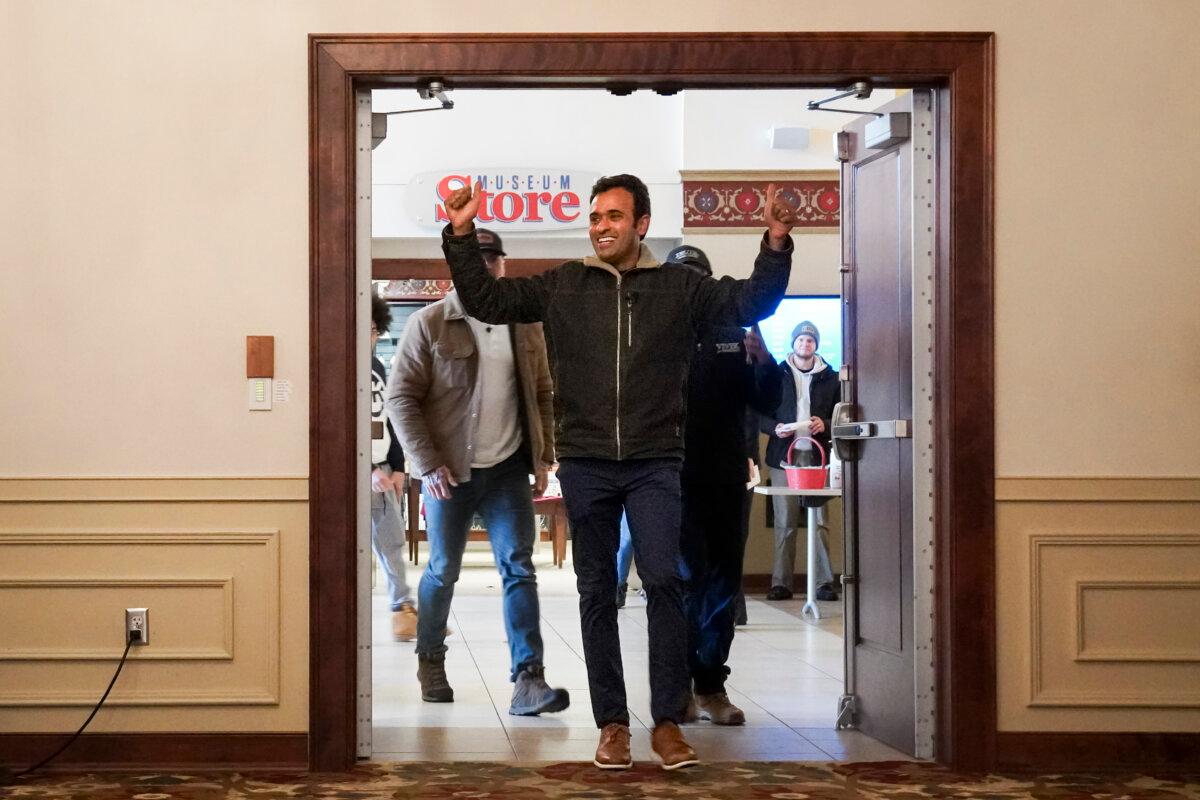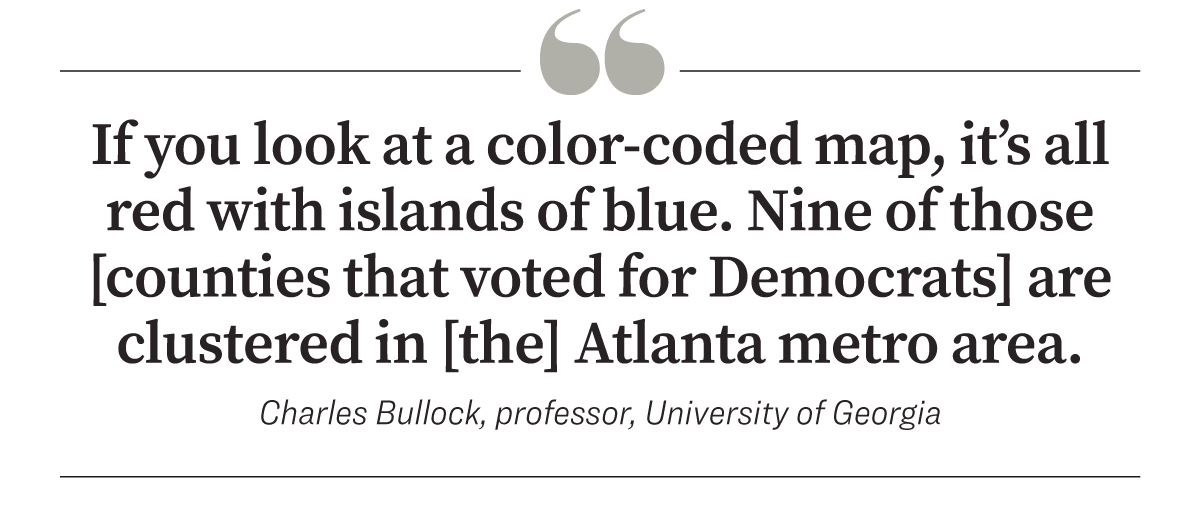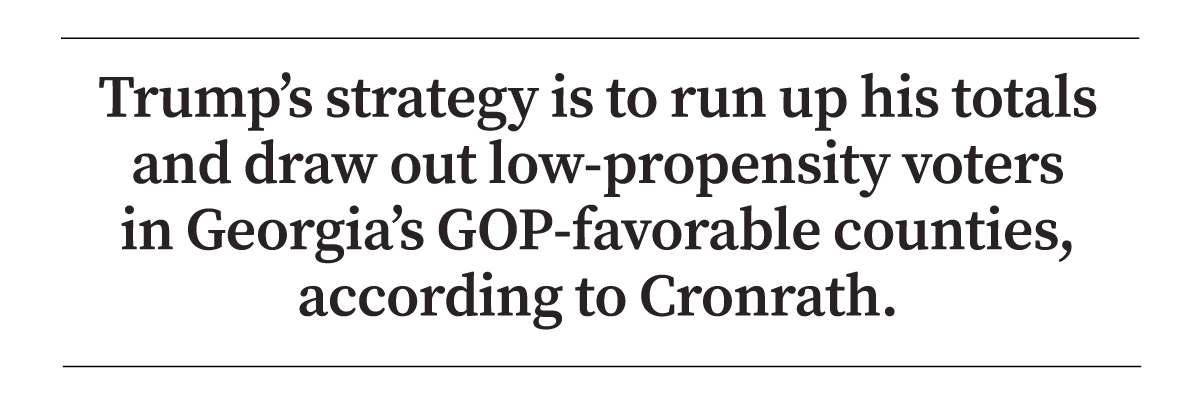For more than a year, Epoch Times journalists have followed presidential campaigns and candidates across the country.
From the attempt on the life of former President Donald Trump in Butler, Pennsylvania, to violent protests outside the Democratic National Convention to “spin room” drama after Trump’s debate with President Joe Biden, we were there covering the news for you.
Today, we divert from our norm—putting aside our personal preferences and feelings and presenting all sides of an issue or event with neutrality—to reveal how we really felt and what we learned during one of the most turbulent presidential races in U.S. history.
Nathan Worcester: Where Cardboard Made Contact With Kevlar
Reporters live for the action: moments of chaos or of decision when the “everyday” is convulsed by history.
On Aug. 21, outside the Israeli consulate in Chicago, I was at the center of what could be described as a human explosion.
The two camps struggled against each other, sending jolts back through the throng of observing journalists. A photographer yelled, “Hold on!”
As bodies tumbled to the ground, I snapped pictures on a cellphone camera. Documenting the action is a reporter’s instinct even when danger looms.

A protester is toppled as police and demonstrators clash near the Israeli consulate in Chicago with the Democratic National Convention happening nearby on Aug. 20, 2024. (Nathan Worcester/The Epoch Times).
More than half a year earlier, the action was in Iowa.
The state was about to hold this election cycle’s first-in-the-nation Republican caucus, a contest that Trump ultimately would win.
Days before that Jan. 15 event, the National Weather Service called the region’s blizzard conditions “life-threatening.” Indeed, it derailed some campaigns. But for my news-gathering, I needed to drive 94 miles from Iowa City to Marshalltown.
A long stretch of U.S. Route 30 was under construction. Cars had been routed onto a temporary lane that would have been hard to make out in the best of conditions, but it was exponentially more difficult in the swirling snow.
Every 50 feet or so, I slowed before passing over a snowdrift that had blown into the road. Ba-CLUNK.
Candidate and businessman Vivek Ramaswamy and his team also pushed on through the tough weather. His spokesman, Zach Henry, conveyed their attitude in a message to me: “Full steam[,] baby.”

After much anticipation, Vivek Ramaswamy arrives at the National Czech & Slovak Museum & Library in Cedar Rapids, Iowa, on Jan. 11, 2024. (Nathan Worcester/The Epoch Times)
Then there were the faster chases: attempts to catch notables, mostly candidates, and score a comment.
Some stick with you more than others.
Days before Biden exited the presidential race, I was prowling the halls of the Republican National Convention. I spotted David Axelrod, an ex-adviser to President Barack Obama. Axelrod wouldn’t stop, but he let me walk with him and lob a few questions.
I ended on the big one: Did he have any speculations about the then-breaking story that Biden would drop out very soon?
“I really don’t,” he said.
Ahead of decisive action, that single word—“really”—felt heavy with meaning, especially from a man who had raised concerns about a second Biden run as early as 2022.

Epoch Times reporter Nathan Worcester snaps a selfie while embedded with protesters near the 2024 Democratic National Convention in Chicago on Aug. 22, 2024. (Nathan Worcester/The Epoch Times)
Janice Hisle: The Pop-Pop-Pop That Marked My Soul
As The Epoch Times’ lead reporter covering Trump’s 2024 campaign, I scurried to more than 50 of his events, trudging through blizzards in Iowa and baking under the unforgiving desert sun in an Arizona border town.
Among all those places, an unlikely location on the western edge of Pennsylvania—Butler Township, population 17,000—became the most memorable. Twice. But for a different reason each time.
The pop-pop-pop of the three initial gunshots aimed at the former president on July 13 will always ring in my head. Those three little pops left permanent impressions on my soul.
I think that’s true for nearly everyone who was at the Butler Farm Show fairgrounds when gunfire disrupted Trump’s rally a few minutes after it started on July 13.

Former President Donald Trump is surrounded by Secret Service agents after being shot at a campaign rally in Butler, Pa., on July 13, 2024. (Evan Vucci, File/AP Photo)
Instantly, we Butler attendees became members of an “I was there” club—one we never wanted to join, just like so many other people who have been swept into traumatizing events ranging from wars to natural disasters.
At the same time, tens of millions of TV and internet viewers were watching the shooting live, as it happened—making them part of the club, too, albeit from a distance.
TV cameras capture a lot, but they can’t adequately convey the ripples of shock, terror, and confusion that spread through the crowd. Those feelings were palpable for those of us who were there.
When people gasped, we didn’t just hear it; we felt it. The same was true when people screamed and when they cried.
People in my part of the venue were stuck behind TV cameras that blocked our view of the stage. So after diving for cover, we were puzzled when the crowd suddenly began cheering.
We didn’t know that people surrounding the stage had seen Trump rise to his feet and make his now-famous, fist-pumping “fight-fight-fight” battle cry.
Relief over Trump’s survival was dampened as word spread: Three other men had been shot, one fatally.
At the same time, reporters like me were scrambling to “get the story” as police yelled for everyone to leave.
Many attendees patiently gave interviews, even though they were shell-shocked. Some asked reporters if they were OK.
They accused certain media outlets of biased, unfair reporting against Trump, implying that they may have played a role in radicalizing a would-be assassin.
Other reporters and I breathlessly interviewed people as we hustled to our cars.
Back at the hotel, I worked on the story with my colleagues. At 3 a.m., I collapsed onto my hotel room bed.
After just two hours of sleep, I was out the door, ready to travel to my next assignment. But the weather caused flight delays. So I had to drive 11 hours instead to Milwaukee for the Republican National Convention.

Epoch Times reporter Janise Hisle trudges through the snow to get to a press event in Iowa on Jan. 13, 2024. (John Fredricks/The Epoch Times)
After that four-day stint, I drove four hours to Grand Rapids, Michigan, for Trump’s first rally after the assassination attempt. It was also his first as the newly minted 2024 GOP presidential nominee.
As crowds lined the streets, police cruised past on bicycles, on horseback, and in vehicles. Everywhere those police went, Trump supporters cheered, applauded, and shouted, “Thank you.”
Later, when I finally had time to reflect, I wrote a first-person account of the rally in Butler, partly as therapy for myself and partly to give Epoch Times readers an unusual perspective.
Butler 2.0
Soon after the assassination attempt, Trump announced that he intended to return to Butler.
Hearing that made me grit my teeth. Was this a good idea? Was he tempting fate? How would another rally at the same location affect the family of the man slain at Butler, Corey Comperatore?
When the “Back-to-Butler” date was announced, I knew I had to be there—as a reporter wanting to follow the story and as a person needing to come to terms with what had happened there on July 13.
Still, I felt leery. I hoped that the Secret Service had addressed the security lapses that contributed to the shooting, including failing to secure the rooftops of nearby buildings. I worried that things could go sideways just the same.
The night before “Butler 2.0,” I barely slept. Too many thoughts swirled through my mind.
Shortly after 5 a.m. on Oct. 5, I headed to the rally site—12 hours in advance of Trump’s scheduled remarks.
As I walked out of my hotel, I stopped in my tracks. A large American flag, illuminated in the surrounding darkness, was billowing gently in the crisp fall air. I paused to appreciate that sight before driving to the venue.
As I arrived at the rally grounds, my mind flashed back to the day of the shooting. A sense of déjà vu crept in. But after I saw how the stage and seating arrangements were set up, I felt reassured. So did the people I interviewed.
This time, bulletproof glass shielded the speaker’s podium. Taller bleachers and large white containers had been set up, concealing the rooftop that gave the July 13 gunman an unobstructed view of the stage.
And a display paying homage to Comperatore, the slain rallygoer, stood out in the bleachers, surrounded by flowers. Various speakers took the stage, all paying respects to him.
Then, when Trump began his remarks, he paused for a moment of silence in honor of Comperatore. Chimes sounded. Christopher Macchio, an operatic tenor, moved people to tears with a somber rendition of the 200-year-old song “Ave Maria.”

Elon Musk, founder, CEO, and chief engineer of SpaceX, speaks during former President Donald Trump’s rally in Butler, Pa., on Oct. 5, 2024. (Samira Bouaou/The Epoch Times)
Although the return-to-Butler event had its share of lighthearted and political moments, the tone of the rally was unique because of the emphasis on Comperatore and healing from the trauma of the July 13 shooting.
People said they were glad they came. One woman told me that she felt “restored.” A man told me that he thought the event “transcended politics.”
At the very end of the Oct. 5 event, Macchio spent about nine more minutes singing as the former president remained onstage, repeatedly mouthing “wow” at Macchio’s virtuosity.
The singer’s voice rang out so clearly and beautifully that it made me stop scribbling in my notebook.
I stood, listened, and reflected on this fact: In the spot where gunshots and shrieks had erupted 12 weeks earlier, Macchio’s soothing, harmonious tones were now the dominant sound in the air—a special memory I will cherish long after my wild ride on the 2024 campaign trail is over.
Lawrence Wilson: Politics at Its Best
Two experiences in two places, practically opposite in every way, will stand out among my memories of the 2024 campaign.
My reporting began in Iowa on July 4, 2023, when I covered an early appearance by former Vice President Mike Pence, then a Republican candidate for president.
Pence and his wife, Karen, marched in an Independence Day parade on a sweltering day in Urbandale, Iowa. Sweating, smiling, and shaking outstretched hands, they walked every step of the two-mile route.
The Pences traveled an hour north for a meet-and-greet with about 30 Iowans at a rural utility company. He spoke for about 20 minutes, then lingered for an hour or more, greeting every person in the room. I thought they would never leave.

Epoch Times reporter Lawrence Wilson prepares to cover the Republican presidential primary debate at the University of Alabama in Tuscaloosa on Dec. 6, 2023. (Lawrence Wilson/The Epoch Times)
I witnessed scenes like that a dozen times with presidential hopefuls all over the state.
Iowans are nice, but they offer no place for a candidate to hide. A teleprompter is useless in a diner or VFW hall. To win votes, you have to look people in the eye, give simple answers to direct questions, and eat a lot of apple pie.
That was one view of the campaign trail.
Atlanta provided a distinctly different view.
That’s where the newly nominated Vice President Kamala Harris held her coming-out party on July 30. This Georgia event was everything Iowa is not: hype, energy, hip-hop, glamour, and celebrities.
More than 10,000 people waited in line for hours—braving the Atlanta heat and torrential rain—to get inside the venue. When Harris at last appeared, their pent-up anticipation, relief, and joy erupted in an ovation. Chants and cheers went on for minutes. It was like a rock concert or a Super Bowl, a moment when thousands upon thousands of people were focused, energized, and totally in sync.

Epoch Times reporter Lawrence Wilson (R) works alongside colleagues and other journalists at the Democratic National Convention in Chicago on Aug. 22, 2024. (John Fredricks/The Epoch Times)
I loved Iowa because it made me believe that politics, even at the highest level, is local. Ordinary folks—farmers, school teachers, accountants, auto mechanics—get to meet the people vying for the highest office in the land, then get together and make a decision about them.
I think we need more of that.
I loved Atlanta because it reminded me what it’s like to be part of a movement, to sense the excitement, energy, and optimism that flow when cheering in agreement with a crowd of fellow Americans.
I think we need more of that, too.
Emel Akan: Voters are Deeply Invested
One of the most unforgettable moments while covering the 2024 election was the June 27 debate between Biden and Trump.
I was in CNN’s media “spin room,” where journalists can speak with candidates and their surrogates.
The event became one of the most significant debates in U.S. political history. It shifted the trajectory of the election, ultimately leading to Biden’s decision to exit the race just weeks later.
In the days following the debate, I attended numerous campaign events for Biden. At his final appearance in Detroit, he reassured his supporters that he was “not going anywhere.”
A week later, he announced his withdrawal from the race in a letter posted to social media platform X.
Witnessing this pivotal moment while closely following Biden was an interesting experience.

Epoch Times reporters Emel Akan (L) and Janice Hisle prepare to cover the presidential debate between President Joe Biden and former President Donald Trump in Atlanta on June 27, 2024. (Madalina Vasiliu/The Epoch Times)
I went on to attend campaign events for Harris, including her recent rally in Houston that featured an appearance from pop star Beyoncé in a packed stadium.
Then, at a rally in Washington, the Democratic candidate made her closing arguments. The joy, excitement, and anxiety of her supporters were palpable. I spoke with many of them, and one supporter became emotional when I asked what she would do if Harris were to lose the election. She told me she would be “devastated,” and she began to cry.
These moments highlight just how deeply people are invested in this election and the strong emotions they have toward their candidates. It’s a big part of why this election cycle has been so unforgettable for reporters.
John Haughey: America ‘Still Exists’
My most memorable moments of this election cycle were less about moments and more about a realization in the spring of 2022, during midterm primaries, that there would be no pause in politicking, no detente in the division, no break from yapping ideologues who profit from polarity, no incentive to find consensus in Congress anytime soon.
Everything that’s happened since then in the most dysfunctional, distracted, discordant House in 170 years was predictable that spring. The never-back-downers, no-compromisers, celebrity-seeking grandstanders would dominate by sound bite, dictate by hyper-partisanship, and deliver speeches but bring about few results.
As a congressional energy reporter who dips into defense budgets and foreign policy, I get drafted to cover elections. This often means parachuting into a surreal disconnect between what candidates, including incumbents, say in campaigns and how they deliberate in hearings on actual decisions they’re called on to make.
In this election cycle, I glimpsed real Americans trying to make sense of it all.
There were Democrats in West Virginia fighting for relevancy as their once-dominant party and the unions that supported it disappeared.
There were North Dakota frackers all for “Drill, baby, drill” but fearful about fluids their trade flushes into the earth.
There were Wyoming coal miners rebranding themselves as “energy workers,” while federal public lands evolved into a vast industrial park of innovation.
There were Hudson Valley Democrats in districts Republicans won in 2022—among six seats the GOP flipped in blue New York—who voted for moderates such as Reps. Mike Lawler and Marc Molinaro. And they wanted to again. But, they said, they loathed the Republican party’s current national tenor.
There were the “Bridge People” on the Southern Boulevard Bridge that spans Florida’s Lake Worth Lagoon between Palm Beach and West Palm Beach. It’s 100 yards from pink-walled Mar-a-Lago. These supporters of the former president flew Trump flags, sentinels of the sentiment that, although he was not in office, he still was in their hearts. As a nod to their efforts, Trump sent them pizza.
There were Republicans campaigning in Nevada’s House primaries where, despite increasing GOP voter registrations, they couldn’t seem to break Democrats’ stranglehold in three Las Vegas-area congressional districts.

Former President Donald Trump tosses caps to the crowd at the Iowa State Fair in Des Moines, Iowa, on Aug. 12, 2023. (Madalina Vasiliu/The Epoch Times)
In the summer of 2023, Kari Lake milked a cow at the Iowa State Fair, where real people get close to candidates unlike anywhere else. And there was Iowa in January, when caucuses were staged after back-to-back blizzards braced by minus-40-degree nights.
There was Fareway Meat & Grocery manager John Pentecost scrambling to stock shelves in Waverly, Iowa—milk and bread always go first—72 hours before the caucuses and three hours before he would don his “other hat.” As Bremer County Republican Committee chair, he would walk through the caucus process with 23 precinct captains.
The politicos gathered in the back room of the library in Readlyn, less town than neighborhood, a subdivision of single-family homes amid a patchwork of snow-bound slopes and fields. It has a Main Street with a park, a bank, and Grumpy’s Bar & Event Center. It’s where the 1984 movie “Country,” starring Jessica Lange and Sam Shepard, was filmed.
Many volunteers wore Trump regalia. A few sported DeSantis gear or garb promoting Ramaswamy or Nikki Haley, the former South Carolina governor and ambassador to the United Nations under Trump. They sat elbow-to-elbow, ribbing each other, wondering whether the ice on Plainfield Lake or in Cedar River eddies was solid enough for fishing shanties. Winter walleye is the best-tasting fish, they agreed.
Some worried that Democrats could become “Republicans for a day” and crash their caucuses.
But that was unlikely, they decided. Democrats, they joked, “don’t get along good walking barefoot in the snow” and won’t get to caucuses for lack of electric vehicle charging stations. And besides, they agreed, everyone knows everyone. So they would spot a Democrat interloper trying to fool his Republican neighbors in an attempt to participate in their democratic process.
Several acknowledged that they would be joining “known Democrats” at Grumpy’s to talk football over a beer afterward.
Turnout for the 2024 Bremer County caucus was 938, down from 2016’s 1,445. Trump won with 437 votes, 45.6 percent, about 5 percentage points below his statewide tally.
Pentecost was relieved to have the process completed.
“I'll be happy to not have the texts and the junk mail and the phone calls all the time,” he said.
It was just the beginning, of course, even in Iowa. But no matter what, there would still be ice-fishing and football talk with “known Democrats” over beers.
That’s America. It still exists, if not in a nationalized mediascape, then in places like Readlyn, population 896 “and one grump.”
Madalina Vasiliu: Part of the Mission
Becoming a full-time photographer was a life-changing decision.
It propelled me to a new role covering the sights of the U.S. political scene from behind a camera for The Epoch Times—whose mission I support.

Epoch Times photographer Madalina Vasiliu (L) snaps a selfie as Epoch Times reporters Emel Akan (C), and Janice Hisle (R) make their way toward the venue for the presidential debate between President Joe Biden and former President Donald Trump in Atlanta on June 27, 2024 (Madalina Vasiliu/The Epoch Times)
During my travels covering the 2024 presidential election candidates, I met talented, kind, and humble photographers. I learned to overcome my limitations and realized that there is more to what we see through a screen.
One day, I asked a photographer from another media outlet what he thinks when he and a colleague cover the same event but his colleague’s photo is chosen for publication instead of his.
“Well, if his picture is better, then I am happy to see his work being used,” he told me.
That answer stuck with me.
Since then, I’ve let go of competitiveness. I’ve made tremendous progress by studying other photographers’ work. I’ve admired their techniques, telling myself, “I never thought of that angle, perspective, or composition. How creative!”
A Newcomer’s Perspective
I was born and raised in Romania but recently moved to the United States. Because I’m a newcomer to this country, covering the 2024 presidential election was an amazing opportunity to learn and to visit many states in a short period of time.
Events are different when you experience them in real life rather than on a screen.
We’re all unique, and it’s normal to have different perspectives. However, I’ve noticed how visual journalism can project a particular image of a person. And not always accurately.
I’ve seen photographs of candidates that portray strength, confidence, or lightheartedness. Others portray anger, dullness, or bitterness.
Most political events last hours. The final products of journalism that appear online or in print represent only a small portion of an entire event.
The Democratic National Convention in Chicago is a good example.
The evening programs were intense, lasting up to seven hours. During the first hour, delegates and members of the media typically took their time walking through security before settling into seats.
This year, early videos on social media suggested that there were few people there. But those images showed only a few seconds of a lengthy program during which almost all seats were full.

Balloons drop during the last day of the Democratic National Convention in Chicago on Aug. 22, 2024. (Madalina Vasiliu/The Epoch Times)
Then, during a town hall with Trump, he played his favorite music for an extended period of time while interacting with the audience.
Some reported that it appeared that Trump was “zoning out.” However, being there, I had a different experience seeing the whole picture: Trump on stage, other people around him, the live audience, the overall atmosphere. To those of us seeing the whole picture, he appeared to be having his regular good time.
One image or a few seconds of video footage from an entire event often doesn’t do much justice.
I also recall times when Biden would stumble over a few words during his speeches. Those moments would go viral on social media. But taking just a few seconds out of a full speech to define the whole performance seemed to be an inaccurate portrayal.
Through these experiences, I realized that I should always ask myself more questions when I see short content about someone online. I must do my research to find the complete context.
At political events, attendees are diverse. Some seem quirky.
But a majority of people who attend political rallies are ordinary folks. They dress and carry themselves normally. Nonetheless, through photography, it can be easy to focus on depicting a narrative of how a candidate’s supporters look.
During my trips following the candidates, I did my best to analyze the crowd and photograph multiple guests, trying to reflect the audience overall, not just the ones who stood out.
I recall a rallygoer walking up to me and asking sternly, “Are you reporting the truth?”
I asked her what she thought about that. She analyzed me for a number of seconds. Then she said I looked to her like an honest person, like someone who would report the truth.
It was then that I told her I work for The Epoch Times. She happily greeted me.
This interaction reminded me that I should always do my best to be truthful, professional, and alert to any biases I may have, in order to eliminate them when doing my work.
Packing Fast and Witnessing History
Covering the campaigns of presidential candidates means long hours of work and travel, being away from loved ones, developing a demeanor of flexibility, and learning how to pack in less than 30 minutes.
A recent assignment started on a Friday at 8 a.m. I rented a car in Maryland and drove to Pennsylvania to work with a reporter until late that evening interviewing voters about their thoughts on the election. The next morning, we left at 4 a.m. to catch a flight to Michigan to cover a rally. After a long day and a brief rest, I was up at 3:30 a.m. to catch an early flight home.
It’s been a hectic pace. But it’s also brought opportunities for self-improvement, meeting interesting people, seeing new places, getting to know fellow photographers and reporters, and making unique memories. And it’s given me a first-row ticket to witness history in the making.























































































































